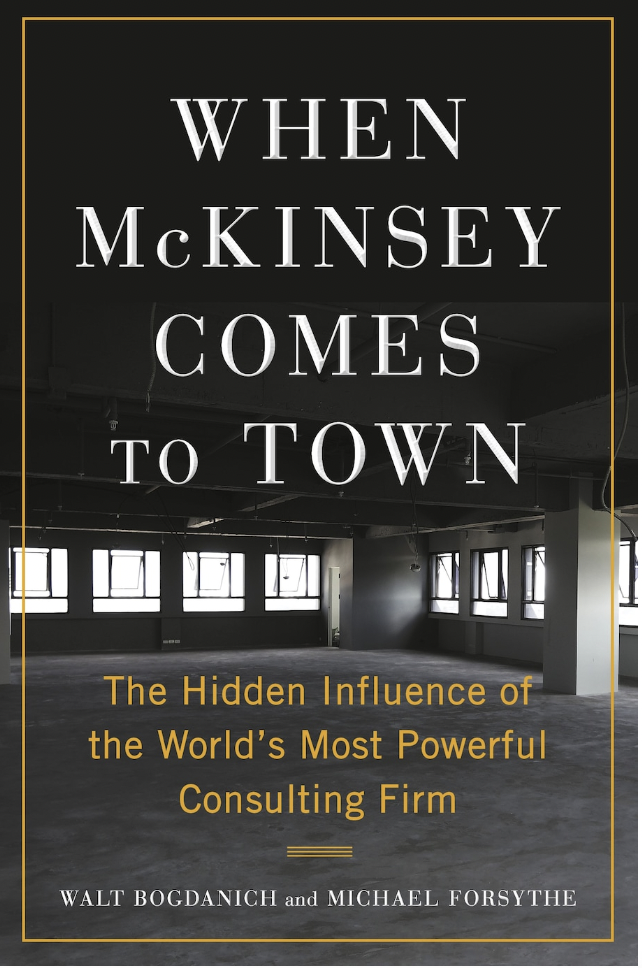
Controversies that dogged McKinsey


New York Times, Investigative reporters Walt Bogdanich and Michael Forsythe, lift the lid of the “culture of secrecy” and shatter the luminous image of McKinsey & Co. the consulting giant, by unearthing conflicts of interest, corruption, hypocrisy, and strategic blunders that read like a prosecutor’s indictment. Vault.com, an employment site asserts that McKinsey with annual revenue of over $ 10 billion, “has achieved a near-universal level of renown”, which employs more than 30,000 worldwide and serves the world’s 100 largest companies in addition to a host of prominent government institutions. McKinsey portrays itself as a “value-driven organization” dedicated to creating “positive, enduring change in the world”. Several senior partners are at the pinnacle of the consulting profession, including Facebook’s Sheryl Sandberg, Chelsea Clinton, and Consumer Protection Bureau Director Rohit Chopra.
The authors expose the firm’s unsavory work with fossil fuel companies, cigarette makers, opioid distributors, regulatory agencies, and autocratic regimes.
McKinsey’s fiercest critics are its own employees, within coruscating exit emails fired off to the whole firm, they call out management for working with controversial clients.
McKinsey is an “amoral institution”, one departing consultant wrote to colleagues around the world, as it advised coal companies “ directly responsible for putting us on the fast-track to planetary omnicide.”
Amid internal revolt over work for the Trump administration’s immigration enforcement agency one speaker said “ If we helped the southern state to improve agricultural asset yield in the 1850s would we still stand behind that? Our guidance so far would indicate the answer is “maybe”.
The Firm remains the elite of global management consulting, operating behind the scenes at thousands of companies and government agencies as a catalyser of the latest management theories and enforcer of red-in-tooth-and-claw capitalist efficiency.
Mckinsey’s South African partners have been embroiled in a corruption scandal where the firm faces charges related to the footing of the state rail freight monopoly. McKinsey has attracted questions from politicians on both sides of the Atlantic over a conflict of interest at its healthcare practice, sued by a Saudi Arabia dissident it identified in a slide deck on social media influencers in the country, which the dissident says led to his family being targeted. Only last year it paid nearly $600mn to settle charges relating to work for Purdue Pharma, peddler of opioid OxyContin, whose sales practices – McKinsey advised to target “high abuse-risk patients” and urge healthcare providers to increase prescriptions and even concocted a plan to issue rebates to pharmacies for every “OxyContin overdose attributable to pills they sold, all this while advising the FDA – were deemed to have contributed to America’s epidemic of addiction. McKinsey apologized although denied illegal activity.
The authors also revealed how McKinsey consultants advised tobacco giant Altria by proposing a smartphone app for Marlboro smokers to keep them loyal to the brand – “more than 50 years after the surgeon-general confirmed the link between smoking and cancer”.
McKinsey is implicated in “dehumanising” banking in the 1950s and setting off a chain reaction that led to the 2008 financial crisis. It also promoted the use of “dehumanising” performance metrics in baseball that the authors blame for cheating scandals.
McKinsey’s reach into business and government around the world, it is inevitably and rightly a focus for discussion on what modern corporations are for, and the impacts they have for good and ill. Public companies could not dodge those debates in the way that a private partnership such as McKinsey has managed until recently.
Bob Sternfels, currently a managing partner, has defended his work for fossil fuel companies, saying it is better to stay engaged and help them cut emissions.
McKinsey had a roster of clients including 43 major carbon polluters since 2010, tobacco companies to fend off regulations, healthcare providers contending with the fallout from smoking, as well as the Food and Drug Administration, which regulated cigarette-makers and advised the Chinese, Saudi Arabian, and Russian governments even as it joined the United Nations Global Compact supporting anti-corruption efforts and human rights.
When McKinsey Comes to Town by Walt Bogdanich & Michael Forsythe, Doubleday $32.50/ Bodley Head £20, 368 pages.
